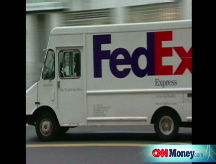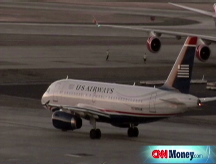Wall Street down as oil turns around
Dow briefly dips below 12,000 for first time in 3 months. Oil reverses direction and surges more than $2.50. Investors ready for 'quadruple witching.'


NEW YORK (CNNMoney.com) -- Wall Street sank Wednesday - with the Dow briefly falling below 12,000 for the first time in 3 months - as oil surged in afternoon trading ahead of a key options expiration day.
The Dow Jones industrial average (INDU) closed down nearly 1.1% and the broader Standard & Poor's 500 index (SPX) was down 0.9%. The Nasdaq composite (COMP) was also down about 1.1% at the end of a volatile trading day.
Markets were volatile in part because investors are unwinding their positions ahead of the so-called "quadruple witching" day on Friday. "Quadruple witching" refers to the day - four times a year - when a range of options expire.
The markets began to sell off Wednesday morning following weak quarterly results from FedEx and Morgan Stanley. The selling accelerated in afternoon trading as financial stocks joined in Morgan's disappointment.
"A couple of household names have come out showing how difficult it is to make money in this market," said Art Hogan, chief market strategist at Jefferies and Company Inc.
Oil prices are also wrecking havoc on investors, with Hogan noting that crude futures are more than twice as expensive than they were this time last year.
"It is impossible to separate corporate America from energy prices and although we are down today and that is good news, we are being reminded that the high energy prices affect business," said Hogan.
Thursday brings a number of economic reports. The Labor Department reports initial claims for unemployment benefits before the opening bell. The Conference Board, a business research group, releases the Leading Indicator index, which predicts the economy's future performance. In addition, the Philadelphia Federal Reserve bank announces its regional manufacturing survey for June.
FedEx swings to loss: FedEx said it swung to a fiscal fourth-quarter loss, hurt by high fuel prices and slowing growth in its domestic-package business. Memphis-based FedEx (FDX, Fortune 500) Corp. posted a loss of $241 million. (Full story.)
FedEx is "a reflection of the overall heart of the economy because they ship goods," said Fred Dickson, chief market strategist at D.A. Davidson & Co. "We have the twin worries coming together there - energy prices and slowing overall consumer demand."
Morgan Stanley leads the financials down: Profits at Morgan Stanley (MS, Fortune 500) fell by more than half last quarter, hurt by a decline in its investment banking and sales and trading businesses, the company reported. The No. 2 investment bank reported a 57% decline in profits. (Full story.)
Other financial shares weakened. Merrill Lynch (MER, Fortune 500), Lehman Brothers (LEH, Fortune 500), and Citigroup (C, Fortune 500) were also trading in the red. Shares of Goldman Sachs (GS, Fortune 500), however, were up in early trading on Wednesday. On Tuesday, Goldman reported sales and profits down from a year ago, but the bank beat estimates.
Financials are one of the main factors leading the markets lower, according to Harry Clark, founder and CEO of Clark Capital Management Group.
Fifth Third Bancorp (FITB, Fortune 500) shares were down most of the day after announcing it will cut its dividends by two thirds. The bank also said that it is working to raise capital to protect against future loan losses. (Full story.)
Shares of the exchange-listed futures broker MFGlobal (MF) also traded down as much as 40% the day after announcing that the company will sell shares to raise $300 million to pay back debts.
Market breadth was negative. On the New York Stock Exchange, decliners beat advancers 3 to 1 on a volume of 1.28 billion shares. On the Nasdaq, decliners beat advancers 5 to 2 on a volume of 2.1 billion shares.
Airlines have to hike fares: As the price of jet fuel approaches $4 a gallon, even traditionally low-cost carriers are being forced to raise fares. Southwest Airlines (LUV, Fortune 500), known for its low fares, said at a conference will need to follow the rest of the industry to keep up with the price of oil.
Energy prices: In a nearly $5 swing from its lows, crude prices ended sharply higher Wednesday following a report that Nigerian oil workers are threatening to go on strike. U.S. crude for July delivery rose $2.67 to settle at $136.68 a barrel on the New York Mercantile Exchange. Oil traded as low as $131.82 shortly after the government released its weekly inventory report before starting the dramatic rebound in the afternoon.
Bush: U.S. "must produce more oil" Congress must face a hard reality," the president said. "Unless members are willing to accept gas prices at today's painful prices or even higher, our nation must produce more oil, and we must start now."
The remarks highlighted the growing political pressure to reduce dependence on foreign oil and deal with rising gas prices.
Gas prices fall: Retail gasoline prices eased for the second day in a row, retreating slightly from their record high, according to a daily survey released by auto club AAA. The national average price for a gallon of regular gas fell three-tenths of a cent to $4.075, according to AAA. (Full story.)
Other markets: In currency trading, the dollar lost against both the euro and the yen in afternoon trading. The dollar's decline was sparked on Tuesday with the release of a report from the Labor Department that showed increasing food and energy prices had driven up wholesale inflation in the United States by 1.4%.
COMEX gold for August delivery was up $6.60 to $893.50 an ounce.
In the bond market, Treasury prices gained, lowering the yield on the benchmark 10-year note to 4.13%. Bond prices and yields move in opposite directions. ![]()




